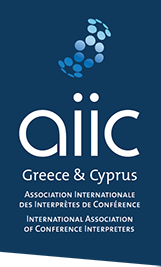Training to become a Conference Interpreter
Would you be interested in pursuing a career as an interpreter?
One prerequisite is a higher education degree, not necessarily in interpreting. Many interpreters earn degrees in other disciplines, prior to completing a master’s in conference interpreting.
Under no circumstances can somebody become a professional interpreter simply by obtaining a degree in languages, however advanced it may be. Professional interpreting calls for specialised training.
The options set out below address both undergraduate and post-graduate courses in conference interpreting.
To assist aspiring interpreters, and help educational institutions improve their services, AIIC performs assessments of a large number of institutions for the benefit of those interested.
Undergraduate education in Greece
The only state university department offering an undergraduate course in conference interpreting is the Foreign Languages, Translation & Interpreting Department of the Ionian University in Corfu. It should be noted, however, that it does not meet all the criteria regarded by AIIC as constituting best practice. Interpreting is a track offered to translation students upon completion of their second year of studies, provided they pass an internal placement exam run by the Department.
There are private entities too, occasionally offering undergraduate courses.
Post-graduate studies in Greece
The only existing post-graduate course in conference interpreting is offered by the Aristotle University of Thessaloniki. This is an interdepartmental master’s degree programme for which four Foreign Language and Literature Departments (English, French, German and Italian) have joined forces with the University's Political Sciences Department.
The length of study is two years, with three semesters of course work, and one semester for practical training, in which a dissertation is also due. Supported languages are Greek (active) and English, French, German, Italian, Spanish, and Russian (passive).
Candidates have to be native Greek speakers, with a Higher Education Degree in any discipline whatsoever, and proficient (C2 diploma required) in two of the passive languages supported by the syllabus. Tuition fees are charged.
Private entities also offer occasional post-graduate courses, usually in partnership with universities abroad.
AIIC assesses available interpreting courses
AIIC maintains close contact with a plethora of university institutions throughout the world. It has established a set of criteria which allows comparison of the various courses, the main aim being to identify the one best suited to each candidates. Some of these criteria are basic, while others are supplementary. The former are considered essential by AIIC for an institution to be regarded as offering studies at an advanced level.
On a regular basis, AIIC sends out a questionnaire to cooperating institutions. This allows it to maintain a roster of schools meeting its basic criteria and includes detailed descriptions of courses, along with check-lists on compliance with supplementary criteria.
The only course in Greece fully compliant with AIIC criteria is the post-graduate level course provided by the Aristotle University of Thessaloniki.
You can search for a course matching your needs here.

